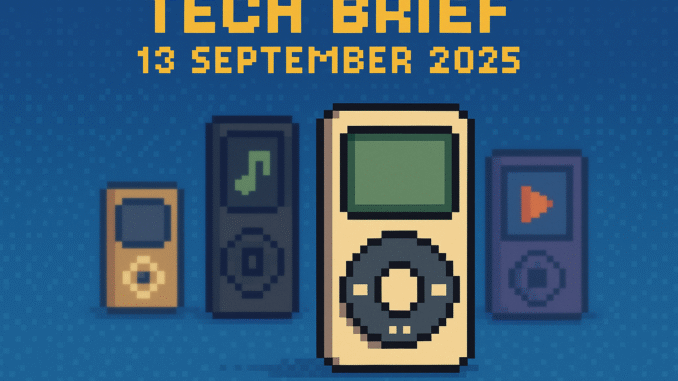
Tech Brief 13 September 2025 brings together the latest headlines on portable audio, government cloud contracts, and public sector IT headaches. September is rarely a quiet month for British tech, and today’s stories cover everything from music nostalgia to the ongoing struggle with legacy software. Missed yesterday’s Tech Brief? Catch up here before diving in.
MP3 Players Return as Streaming Fatigue Rises
“I wanted to actually own my music again,” wrote one reader in The Guardian’s round-up of fifteen new MP3 players. Dozens of brands, including Activo and Snowsky, are now competing to win over listeners tired of endless streaming subscriptions. For many, these digital audio players offer a break from algorithmic playlists and a return to building personal collections. The review highlights how nostalgia for physical music now crosses generations, with younger buyers rescuing their parents’ old iPods. The challenge is reconciling modern touchscreens with the tactile quirks of early models, a feeling anyone who’s ever fought a sticky play button will recognise. MP3 players may be slightly clunky compared to streaming, but what they lack in convenience, they make up for in curation and control.
MoD Goes All In on Google with £400M Cloud Deal
The Ministry of Defence has signed a £400 million agreement for a sovereign cloud platform with Google Cloud. The main selling point: all British military data will be stored on servers within the UK, which is meant to improve data sovereignty. Some will see this as a modern echo of Cold War anxieties over who controls the country’s most sensitive information. This move marks a big shift from previous decades, when the public sector tried to keep every byte under its own physical roof. Computer Weekly’s coverage focuses on transparency, suggesting that the deal will change how the MoD operates from the top down. The legacy of mainframes hasn’t vanished, but now public trust depends on which tech giant has the contract, not whose logo is on the server. Whether this system will be as reliable as the independent, clunky setups of the past is an open question. Security is no longer just about the hardware.
Post Office Horizon: Problems Endure, Replacement Nowhere in Sight
What happens when a legacy IT system refuses to die? The UK’s Post Office is still struggling with this question. Millions in branch discrepancies remain unresolved, and the Horizon platform’s replacement is reportedly years away. This is not simply a cautionary tale about outdated tech. When broken accounting meets unreliable software, the consequences can last for decades. Computer Weekly describes a chain of confusion: decades-old systems, stressed postmasters, and months of uncertainty. Even the most tech-savvy managers are left wondering if mistakes are caused by humans, machines, or both. If you remember waiting for the dial-up helpdesk to answer, you’ll appreciate the frustration. As mentioned above in the MoD cloud story, trusting outmoded digital tools with essential information rarely ends well. Accountability still needs a backup plan.
Government Pushes AI Coding Assistants for Civil Servants
Does Whitehall really need an AI assistant to code a user login page? The Government Digital Service has published guidance encouraging civil servants to use AI-powered programming tools such as GitHub Copilot, promising faster software releases and fewer bugs. For many, this is a big leap, combining traditional British bureaucracy with the unpredictability of automated code. Critics argue that automation can never fully replace institutional memory or careful human debugging. Even the guidance itself warns developers to keep a close human eye on the output. This push signals a generational shift: Gen-X programmers who once wrote BASIC on school BBCs now see code reviewed and written by machines. The result could be faster delivery, but there’s a risk that trust in invisible logic will increase, along with hidden errors. Scrutiny remains essential.
From the Wayback Machine
On This Day: 1983 – Osborne Computer Corporation Disappears
Osborne Computer filed for bankruptcy on 13 September 1983, taking with it the Osborne 1, a 24-pound “portable” microcomputer and the software-bundled revolution of its era. The collapse, fuelled by the infamous Osborne Effect, is now a classic warning for companies that announce future products too soon. Adam Osborne’s misstep changed how firms plan launches, as nobody wants to be left with warehouses of unsold kit. CP/M, once the dominant operating system, faded quickly, and IBM compatibility became the new standard. The cycle of innovation, optimism, and overreach is still going strong. Osborne’s legacy is more than a Silicon Valley footnote. Every time a company leaks a roadmap and the market panics, the lesson gets repeated. Some tech stories really do last.
Today’s Big Question
Should nostalgia for simpler tech shape how we choose our new tools, or is it just background noise? Tech Brief 13 September 2025 highlights the tension: convenience or control, speed or certainty, physical or virtual? Maybe the best habit is to keep one foot in the archive and one in the cloud.
Take five, recharge your playlist, and spare a thought for the old kit quietly blinking in forgotten cupboards. There’s still a place for both.
Missed yesterday’s Tech Brief? Catch up here

Leave a Reply